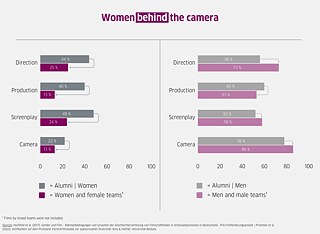Women are young and slim. And they talk about their relationships. Or generally about men. A long-defunct stereotype? As we celebrate International Women’s Day, Lena Maurer takes a look at the discrimination women, who are working in the film industry, are still facing today.
Women in front of the camera
According to a 2021 study by the University of Rostock, there was an almost equal male/female split in lead roles in German feature films between 2017 and 2020. However, the study also found that the practice of casting the majority of female leads as young and slim was still prevalent. There is a sharp decrease in gender parity from the age of 50 with only 30% of lead roles going to women. With regard to persons of higher weight, the study was unable to identify any female actors at all in this category. By contrast, a quarter of the women were considered (very) thin – more than twice as many as their male counterparts.When it comes to representation of people with immigrant backgrounds, German cinema fails to portray anything like a realistic ratio. During the data-collection phase for the study, roughly one quarter of the people living in Germany had immigrant backgrounds. Yet this was the case with only 15% of on-screen protagonists. Moreover, only two of the 851 leading actors in the study sample were non-binary.
All of this has its consequences. What people see at the cinema has an impact on how they see the world around them. So a lack of diversity in the portrayal of women results in gaps in people’s perceptions. As the Afro-American human rights activist Marian Wright Edelman once put it, “You can’t be what you can’t see”.
In 2019, the children’s charity Plan International conducted research on how media representation of women affects the way they see themselves and their ambitions. In a survey of more than 10,000 women and girls from around the world, the respondents reported that what they saw on screen had an impact on them and that female actors tended to play parts that reflected traditional societal norms. In other words, they were seeing women playing people who were responsible for housework or who were potential lovers. The respondents also described the women they looked up to as “beautiful, slim and caring”.
Women behind the camera
One of the reasons why women are often seen in traditional roles could be that the people behind the camera are usually men. The University of Rostock study found that it was much rarer for female protagonists’ conversations to only be about their relationships when the film was directed by a woman. In addition, there were more women on screen when the key creative jobs were done by women, for example when a woman wrote the script or produced the film.However, the production teams behind the German films examined in the study mainly consisted of men. A mere quarter of the films were directed by women or female teams (2% by mixed teams and 73% by male directors/teams) and only 13% were produced by women (34% by mixed teams and 53% by men/male teams). The scriptwriters and camera operators tended to be male, too. These figures don’t really add up. Although almost as many women as men graduate from film-related study programmes, female creatives struggle to realise their potential in the working world, while men are disproportionately active in the respective fields.

The fairy tale of gender equality
“Once upon a time there was a woman. She was young and slim and she was looking for the love of her life. This is her story…” – if she’s actually allowed to play the leading role in the story, that is. True, men and women in Germany have had equal rights since 1957. But that’s only on paper. In practice, there is still a long way to go, as shown by organisations such as Pro Quote Film, which has been working to promote gender equality in the German film industry since 2014. They are just one of a number of alliances that use the annual International Women’s Day on 8 March to speak out on feminist issues.One of the latest studies in this field, presented at the 2024 Berlin International Film Festival, comes to the conclusion that without significant changes, it will take until 2041 to achieve gender parity in key creative positions in the German film industry. So we can only hope that the last sentence of the fairy tale, the one about living “happily ever after”, is referring to diversity and progress rather than perpetuation of the status quo.
March 2024
